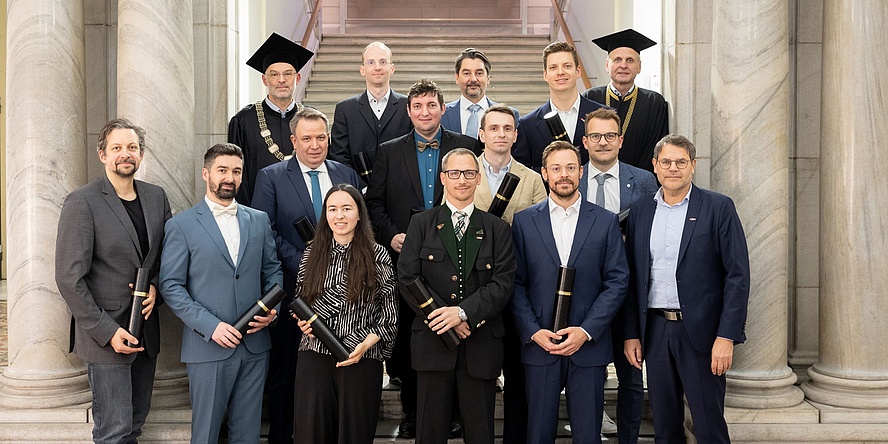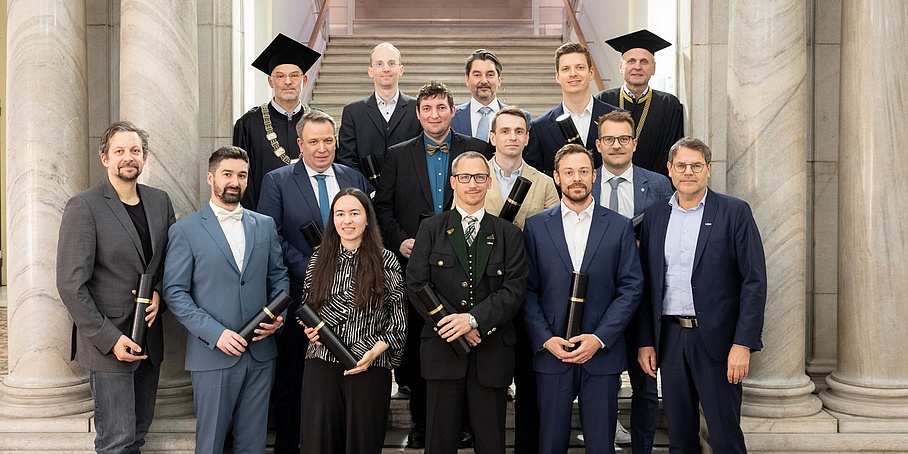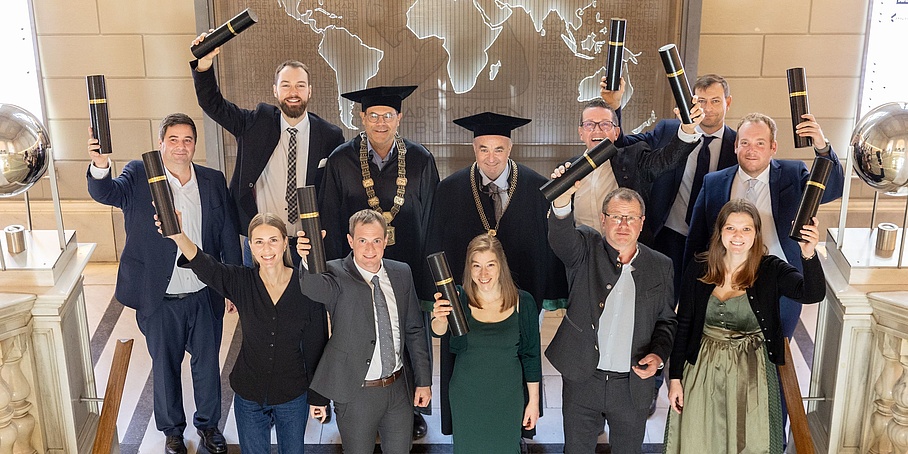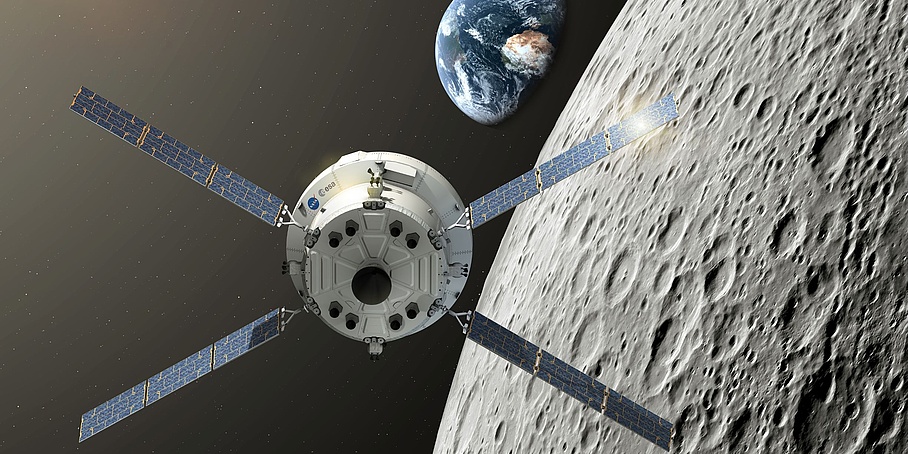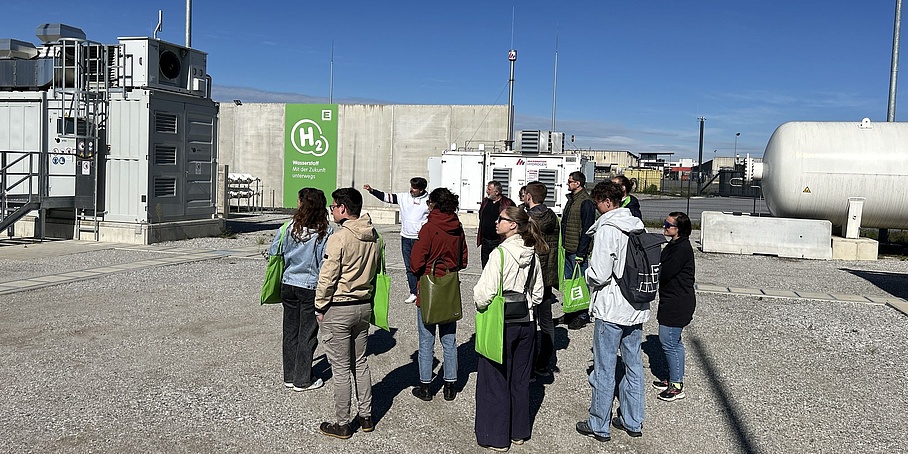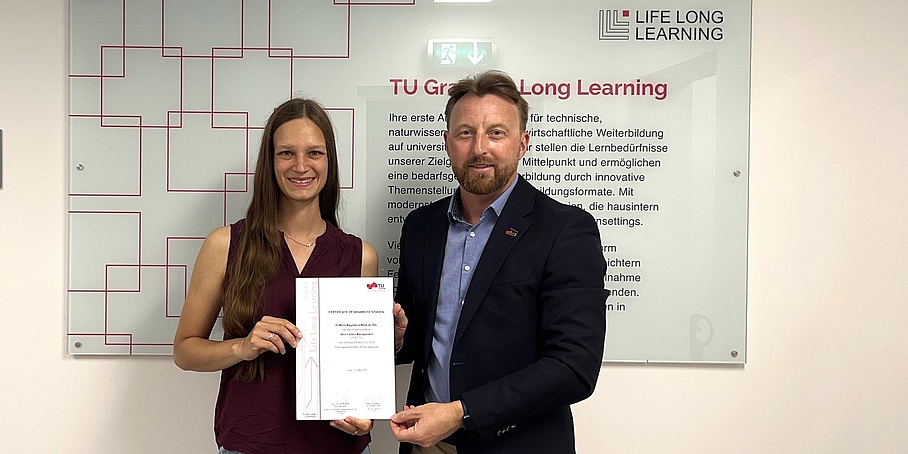December
Missed out on continuing education? New year – new opportunity!
The end of the year is approaching, and once again time has flown far too quickly to realise (all) your continuing education plans?
Put your feet up, take a good long break and enjoy the holidays! We look forward to you starting the new year refreshed, and to supporting you with your education plans for 2026.
Browse our website at your leisure – for any personal enquiries we will be available again from 7 January 2026.
We wish you a MERRY CHRISTMAS, a HAPPY NEW YEAR, and look forward to another year together filled with science – passion – technology!
Your TU Graz Life Long Learning (LLL) Team
*Coming soon to our programme: University Course in Web Application Development
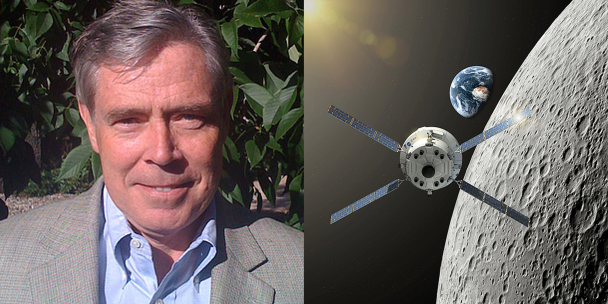
Lecture by Wiley Larson: AI in Systems Engineering of Space Systems
How can AI support the development and operation of space systems? In his lecture, Wiley Larson presents insights from three years of research with NASA and SpaceTech teams, demonstrating how artificial intelligence accelerates development processes and sustainably transforms systems engineering.
Following the lecture, participants will also have the opportunity to learn more about the SpaceTech Master’s programme – Master in Space Systems and Business Engineering.
Dates:
- 12 January 2026, 15:30, University of Stuttgart
- 13 January 2026, 16:30, TU Munich
- 14 January 2026, 14:30, EAC Cologne
- 15 January 2026, 18:00, TU Darmstadt
- 16 January 2026, 17:00, TU Graz
Registration is not required.
Details
Contact: Peter Schrotter
First MBA and Executive MBA Graduation Ceremony at TU Graz
Technology and business? Long since a highly promising combination when it comes to successful career paths. Participants from renowned companies and start-ups recognised this too and strategically expanded their professional expertise.
“We are particularly pleased that we have been able to establish the ‘Master of Business Administration’ and the ‘Executive Master of Business Administration’ as part of our continuing education portfolio, and that we are now able to award this academic degree at TU Graz for the very first time,” emphasised Ernst Kreuzer (Head of Life Long Learning) at the ceremonial graduation event.
He added: “We would like not only to congratulate you on your well-deserved degree, but above all on the outstanding Master's theses, which address the use of digital technologies, artificial intelligence, decarbonisation, and the development of innovative products and viable business models.”
November
20 Years of Life Long Learning – 20 Years of Curiosity, Courage and Change
In the foyer of the Alte Technik building, a festive atmosphere met thought-provoking questions about the future of continuing education:
- Rector Horst Bischof appeared as an avatar, demonstrating how digital technologies can open up new pathways.
- Vice Rector Stefan Vorbach emphasised that continuing education is “not an option, but a necessity, a responsibility… and above all, an opportunity.”
- LLL Director Ernst Kreuzer expressed his gratitude to his predecessor and “founding pillar of LLL”, Christine Stöckler-Penz, and outlined his plans to further expand the modular structure of the programmes to ensure they remain responsive to current needs.
- Educational scientist Eva Cendon (FernUni Hagen) explained in her keynote how universities can remain future-ready through diverse learning opportunities and formats.
A wonderful evening full of reflections and outlooks, joyful encounters – and a dance-worthy finale!
Ad multos annos!
Arrived safely: Graduation Certificates for Accident Research Graduates
For programme director Hermann Steffan, even after nearly 20 years and 13 programme cycles with around 150 graduates from all over the world, it remains a special moment to personally present the elegant scrolls containing the graduation certificates. “Ten new graduates will apply the expertise they have acquired to enhance traffic safety in the future – whether on the road or in the air, in accident prevention or accident analysis,” said the internationally renowned expert and court-appointed assessor at the festive graduation ceremony on 29 October in the Aula of the Alte Technik.
The fact that digitalisation has long since become part of accident research is reflected in the topics of the Master's theses. These range from virtual on-site inspections of accident locations using VR headsets to the evaluation of digital data from event data recorders in vehicles, and the use of smartphones and drones for photographic accident documentation.
We wish all graduates the very best for their future paths!
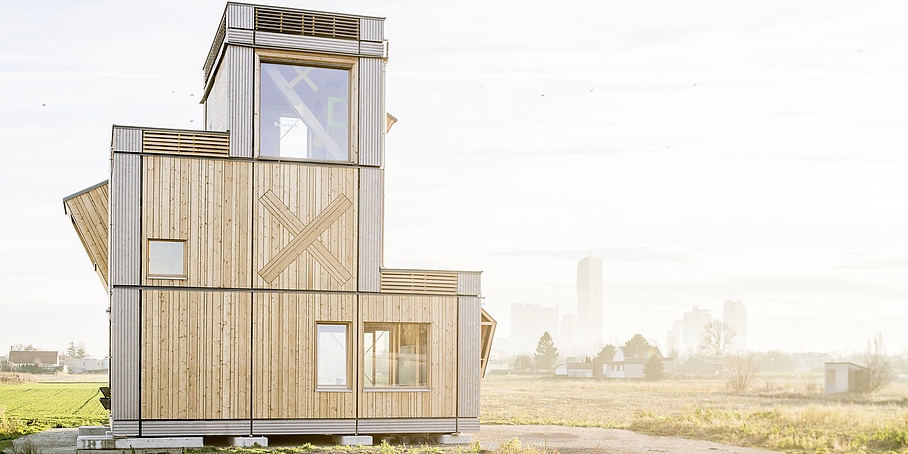
Certificate Programme in Sustainable Construction: Apply by 26 November!
Stay at the forefront of innovation with the University Programme in Sustainable Construction, jointly offered by TU Graz and TU Wien.
Decarbonisation, economic efficiency, and social sustainability are key topics of this two-semester continuing education programme for professionals and executives in the construction sector.
You will learn how to make existing structures fit for the future and how to implement new buildings in a resource-efficient way – in line with current standards, legal requirements, and the full life cycle of buildings.
Enhance your portfolio and position yourself as a specialist in sustainable construction!
Take advantage of our online consultation sessions on 7, 14, 18, 20, 21, and 24 November to ask any remaining questions.
Next programme start: 16 January 2026
Further details on the Sustainable Construction Programme: TU Graz website and TU Wien website.
Apply Now: SpaceTech Master's Programme – Application Deadline Extended to 31 January 2026
The global space sector is thriving – with groundbreaking technologies, innovative services, and bold new ventures launching every day. As the industry expands, so too does the demand for highly qualified experts and visionary leaders.
The SpaceTech – Master in Space Systems and Business Engineering equips you with the skills and knowledge to thrive in this fast-moving, international field – through a solid education in technology, management, and systems engineering. The programme covers a wide range of topics, from earth observation and navigation to human spaceflight.
Courses are delivered by leading industry experts and take place at seven top-tier European space centres – offering an unmatched blend of academic excellence and real-world insight.
Find out more about the SpaceTech Master’s programme
October
From the Lecture Hall to Practice: Excursion to the Renewable Gasfield
Since May 2023, Austria’s first non-industrial production facility for green hydrogen — the Renewable Gasfield — has been in operation in this community in southern Styria.
During a guided tour of the 10,000 m² pilot plant, course participants had the opportunity to experience the application of sustainable energy technologies firsthand and to complement their academic knowledge with practical insights into Power-to-Gas technology. The facility operated by Energie Steiermark vividly demonstrates the integration of electrolysis, methanation, and biogas utilization into a closed, CO₂-neutral energy cycle. Green hydrogen and synthetic methane are produced, stored, and fed into the grid under real operating conditions. In the future, the green gas from Styria aims to contribute to the decarbonization of industry and mobility.
For the excursion participants, one thing became clear: Decarbonization is possible!
On the Diversity of Mobility
Under the motto “Life is Science in a World Turned Upside Down”, the 20th European Researchers’ Night took place on 26 September at the Universalmuseum Joanneum. Once again, our representatives from the project EE4M (Engineering Excellence for the Mobility Value Chain) were there. The project, funded by the EU and the EACEA, addresses the growing need for education, training and further qualifications for engineers within the mobility value chain.
At the heart of the presentation was an interactive station with LEGO® bricks. With these, children and young people were able to reconstruct the mobility value chain step by step: from the initial design concept, to the choice of raw materials, logistics and production, through to marketing strategies. Out of colourful bricks emerged small but telling models that made complex processes tangible. It became clear that mobility is not a rigid concept but a field full of possibilities, fuelled by fresh ideas.
At Researchers’ Night, it was demonstrated how young people can be playfully inspired by science and how valuable it is to make it a hands-on experience.
September
New in the Programme: University Course Mindful Leadership
Stand up and inspire your team, see the bigger picture and lead with mindfulness: the university course Mindful Leadership qualifies executives for responsible action in dynamic, technology-driven environments. Practical, interdisciplinary and innovative, the course conveys modern leadership approaches while strengthening resilience, creativity and future skills.
Find out more at the upcoming online information sessions on 14 October, 25 November or 8 January.
Additional Offer:
As part of the DIH SÜD qualification programme, the two-day seminar Mindful Leadership in the Digital Transformation is also available. This seminar is subsidised and can be attended free of charge by employees of SMEs. Recognition towards the university course Mindful Leadership may be possible if required.
Attention, Brainfood – Continuing Education Opportunities this Autumn!
Find out more and apply now for
- AI Essentials
Start 23 October, application by 26 September 2025 - Corporate Mobility
Start 3 November, application by 27 October 2025 - Energy & Green Production 2: New Processes, Biorefinery, Green Hydrogen
Start 3 November, application by 27 October 2025 - Low and No-Code Machine Learning with KNIME
Start 20 November, application by 24 October 2025 - KI Use Cases
Start 4 December, application by 7 November 2025
Certified Zero Carbon Manager
The university course in Zero Carbon Management focuses on the key challenges of sustainable business: from carbon accounting and supply chain requirements to strategies for decarbonisation. These foundations are complemented by practical insights into the fields of Energy and Green Production, Mobility and Logistics, and Sustainable Buildings.
“In today’s world it is becoming increasingly important for all professions to expand their knowledge in the field of Zero Carbon Management. That is why I am very pleased to have gained an overview of the various developments in this course,” says Maria Malacek, who further specialised by completing two modules with a focus on Energy and Green Production.
We wish her continued success and all the very best for the future!

